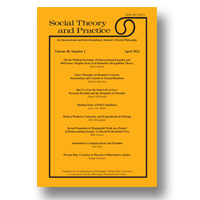|
|
|
1.
|
Social Theory and Practice:
Volume >
36 >
Issue: 2
Lisa Rivera
Worthy Lives
abstract |
view |
rights & permissions
| cited by
Susan Wolf's paper "Meaning and Morality" draws our attention to the fact that Williams's objection to Kantian morality is primarily a concern about a possible conflict between morality and that which gives our lives meaning. I argue that the force of Williams's objection requires a more precise understanding of meaning as dependent on our intention to make our lives themselves worthwhile. It is not meaning simpliciter that makes Williams's objective persuasive but rather meaning as arising out of our positive evaluation of the value of our lives as a whole. This type of meaning has a normative element: it involves a person's deep-seated commitment to make her actions consistent with ends that confer worth on her life itself. The more significant conflict with morality lies in the conflict between the normative force of moral requirements and the normative force of the need to have a life that is itself worthwhile.
|
|
|
|
|
|
|
2.
|
Social Theory and Practice:
Volume >
36 >
Issue: 2
Brian McElwee
The Appeal of Self-Ownership
abstract |
view |
rights & permissions
| cited by
In this paper, I argue that the appeal of a principle of self-ownership is grounded in the specially intimate relationship that each of us has with our body. I argue that once we appreciate the source of the appeal of a claim of self-ownership, we can see how a differently shaped set of strong rights over our body can do justice to the considerations that ground this appeal, without committing us to the most controversial implications of a claim of self-ownership.
|
|
|
|
|
|
|
3.
|
Social Theory and Practice:
Volume >
36 >
Issue: 2
Daniel Engster
The Place of Parenting within a Liberal Theory of Justice:
The Private Parenting Model, Parental Licenses, or Public Parenting Support?
abstract |
view |
rights & permissions
| cited by
Parenting has an ambiguous place within the liberal tradition. On the one hand, liberal theorists have traditionally portrayed it as a private activity. On the other hand, they have also acknowledged the need for some public regulation of parenting in order to protect children’s interests. Some theorists have suggested that this ambiguity within liberalism can be best resolved by implementing parental licensing plans that would limit childrearing opportunities strictly to individuals who could prove their psychological, moral, and financial competency to raise children well. In this article, I critique parental licensing schemes from a liberal perspective and argue that public parenting support, including paid parenting leaves, public childcare subsidies, and the like, is more consistent with liberal values and, in fact, a necessary component of any coherent liberal theory of justice.
|
|
|
|
|
|
|
4.
|
Social Theory and Practice:
Volume >
36 >
Issue: 2
Todd Calder
Shared Responsibility, Global Structural Injustice, and Restitution
abstract |
view |
rights & permissions
| cited by
This paper argues that even the most virtuous people living in affluent Western countries share responsibility for injustices suffered by poor people living in developing countries. The argument of the paper draws on a moral principle that underlies the law of restitution: the principle of unjust enrichment. The paper argues that denizens of affluent Western countries have benefited unjustly from injustices suffered by poor people living in developing countries and that they have a moral responsibility to pay back their unjust gains.
|
|
|
|
|
|
|
5.
|
Social Theory and Practice:
Volume >
36 >
Issue: 2
Nahshon Perez
Why Tolerating Illiberal Groups is Often Incoherent:
On Internal Minorities, Liberty, “Shared Understandings,” and Skepticism
abstract |
view |
rights & permissions
| cited by
This article suggests that in cases in which illiberal groups face internal disagreement, plausible liberal arguments for toleration of such groups are hard to find. Since internal disagreement is widespread, this article proposes that arguments that attempt to justify toleration vis-à-vis illiberal groups are mostly incoherent views. I differentiate this argument from a different issue, namely, whether there is a justification for an external liberal agent to actively intervene in cases in which there exists a justification for lack of toleration.
|
|
|
|
|
review essay |
|
6.
|
Social Theory and Practice:
Volume >
36 >
Issue: 2
Jonathan Quong
Justice Beyond Equality
abstract |
view |
rights & permissions
| cited by
This essay reviews G.A. Cohen’s final major work, Rescuing Justice and Equality. In the book, Cohen challenges the Rawlsian account of the content and the concept of justice. This essay offers a summary of Cohen’s main arguments, and develops objections to several of those arguments, particularly Cohen’s claim that his proposed egalitarian ethos is not vulnerable to a well-known trilemma (liberty, equality, efficiency) that might be pressed against it. The essay’s final section offers critical reflections on the important differences between Cohen’s and Rawls’s views about the nature of justice, and suggests that Cohen’s view may not be helpful if we believe justice is a complex value that includes considerations other than distributive equality.
|
|
|
|
|
book reviews |
|
7.
|
Social Theory and Practice:
Volume >
36 >
Issue: 2
Mira Bachvarova
Ownership, Authority, and Self-Determination
view |
rights & permissions
| cited by
|
|
|
|
|
8.
|
Social Theory and Practice:
Volume >
36 >
Issue: 2
Karen Green
Canon Fodder:
Historical Women Political Thinkers
view |
rights & permissions
| cited by
|
|
|
|
|
9.
|
Social Theory and Practice:
Volume >
36 >
Issue: 2
Glen Pettigrove
I Was Wrong:
The Meanings of Apologies
view |
rights & permissions
| cited by
|
|
|
|
